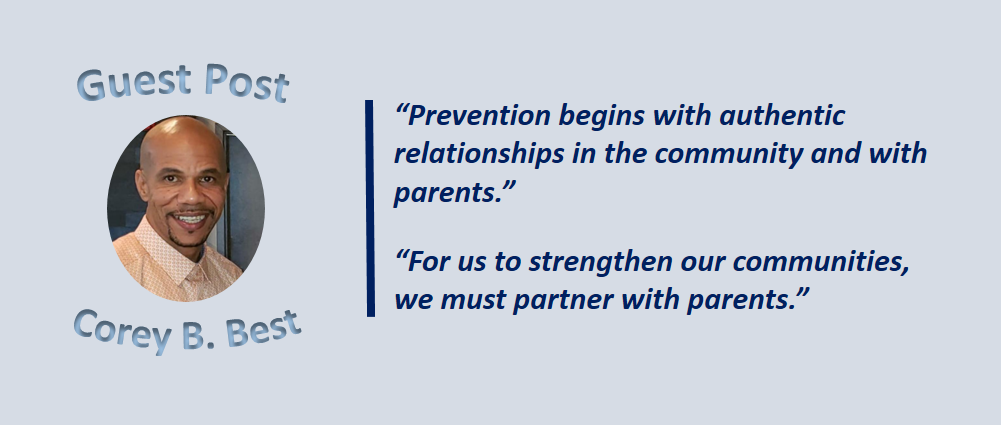
Written by Corey B. Best, consultant and professional guide, Birth Parent National Network, for the Children’s Bureau Express. HOPE is fortunate and grateful to have Corey as a member of its National Advisory Board. Re-posted here with his permission.
When I began my career more than 10 years ago as an eager community organizer and professional, I soon realized that I needed to learn, unlearn, and relearn new ways of thinking about how I viewed the world and communities and, most importantly, how I viewed myself and my peers.
The reality was and remains that I view myself as worthy, resilient, and filled with hope. However, I never quite understood why systems that were designed to support, nurture, and live by such a high standard viewed me as broken and in fact treated me and others around me as such. This daunting and harsh lesson about systems, specifically our child welfare/protection system, required a deeper look at our collective, institutional history to gain insight into our perpetual cycle of why we feel we must “save and rescue” parents and children. Eventually, I began to seek truer answers to a few baffling questions:
- Where did I get the idea that I wasn’t good enough?
- Who conditioned me to believe that my race is a danger?
- Why was I so attached to conflating needing help with being broken?
In my quest for greater self-discovery, I quickly realized that the reality I inherited and was indoctrinated into was a paternalistic system of ideologies that often are allowed to subjugate, dehumanize, judge, and deem parents unworthy of the basic dignities of life—to be seen, heard, and valued as being equals, good enough, hopeful, and resilient. These age-old legacies shape the way we practice, provide services, assess safety, and establish relationships with parents.
Along the journey, I’ve witnessed and experienced many oppressive and suffocating experiences. But none of those have broken me. In fact, some parents experience far worse when they need help that is not available, face criteria that are too stringent, or have been given the band-aids of several programs rather than one that is focused on root cause, community conditions, or invited Maslow’s hierarchy of social needs into their lives. Even when some families feel that our systems are there to provide support and engage them, countless others often find the face behind the glass saying, “we don’t offer that here.” And even so, those families’ resilience grows!
My core values of justice, social contribution, and family are enriched by the conversations I have with parents across the country about what works to keep families strong, healthy, and thriving. While hosting Community Cafés, focus groups, and healing circles with parents, the common denominator is one brave soul. Parents have indicated that even during the mess, chaos, homelessness, substance use, domestic violence, and loss of employment, it only takes one human being to show up and acknowledge their assets.
We know that child neglect and abuse is preventable, and our child welfare system plays a critical role in developing and cocreating conditions where families are seen for who they are—human beings. However, along the way we must remain focused on the following adaptive challenges (i.e., challenges without a clearly defined solution and that require input from the collective community):
- Allowing parents to become a part of the solution
- Sharing power with parents
- Normalizing help-seeking behaviors
- Deactivating bias-driven practices
- Creating universal access to concrete support for all parents
- Becoming brave enough to dismantle racism
- Asking yourself, “Is this good enough for my child?”
The beauty of adaptive strategies is, once identified, they’ll help us embrace how interdependent we are and that the work of re-imagining a child welfare system that’s focused on primary prevention doesn’t have a clearly defined path. Yet, in order to support families differently, unnatural partnerships with parents are mandatory. Systems are more inclined to partner with formal professionals, experts, and leaders. Partnering with those most impacted by the delivery systems (i.e., parents, caregivers, families) are unnatural, challenging, and seen as less important.
In closing, prevention begins with authentic relationships in the community and with parents. Our current child welfare system has defined prevention as averting a child from coming into foster care. The Birth Parent National Network seeks to push our country forward by elevating the voices of parents and organizations that are bold enough to scream “parents aren’t broken!” We know that for us to strengthen our communities, we must partner with parents. We see parents as treasured leaders—wise and filled with hope. I encourage all to continue mining for gold, not digging for dirt. There’s a nugget inside of all of us. If you can’t find it, you’re not looking hard enough.
The way we see the world is how the world becomes!
To join the Birth Parent National Network, visit https://ctfalliance.org/partnering-with-parents/bpnn/.


